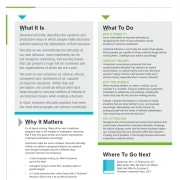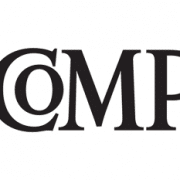Featured Collaborator for October: Dolly Chugh
Interview with Dr. Dolly Chugh, Associate Professor in the Department of Management and Organizations, NYU Stern School of Business. [Find Dolly on Twitter]

What are your main areas of research? How can people better be attuned to their bounded ethicality?
I have always been fascinated by the three dimensional reality of human behavior. That is, none of us are perfectly ethical all of the time, and it’s that reality that I am most interested in. In what ways are we less ethical and less egalitarian than we intend to be? Under what conditions? Why? Those questions lie at the heart of my work on bounded ethicality, which refers to the systematic and ordinary psychological constraints on our ethical behavior.
How does your work on ethical consequences help companies that want to improve themselves as ethical systems?
I hope my work helps companies see the three dimensional nature of people and view ethical systems as ways to prime, nudge, prompt, and inspire people towards who they want to be, embracing rather than denying that none of us are perfectly ethical all the time.
So, this means that companies can also benefit from creating the kind of environment where people can openly discuss where the potential ethical pitfalls are, rather than pretending the pitfalls don’t exist or affect them.
If you could only highlight one piece of work that you’ve been involved with that relates to Ethical Systems which one would it be and why?
I am working with an amazing team of collaborators (Edward Chang and Katy Milkman of Wharton and Modupe Akinola of Columbia Business School) on an exciting project about women on boards, and the tendency for boards to “satisfice” on gender diversity.
We look at field and laboratory evidence that corporate boards may attend to gender diversity issues only until a minimum diversity threshold is attained. That is, corporations may satisfice, rather than optimize, on the gender diversity of their boards. We analyzed data from both the S&P 1500 and S&P 500 and found that boards are significantly more likely to include exactly two females and less likely to include zero females than would be expected by chance, and this pattern is exacerbated for larger companies. Our laboratory data replicates this pattern and suggests the mechanism is participants’ perceptions of the gender diversity of the existing board, with perceived diversity rising non-linearly when there are two female directors versus zero, one, or three.
This project suggests that our perceptions of diversity are malleable, and this malleability also relates to our perceptions of our own ethicality.
Tell us about one of your current or future projects.
I am in the early stages of working on a book project that I am really excited about. It speaks to the challenges of trying to be helpful to someone who is different than us, the challenges of ally-ship. I am hopeful to have more to share on this soon!
How did you first get interested in your field?
I have long been interested in social justice issues, even before becoming an academic. Academia is my second career; I have an MBA and worked in investment banking, consulting, and publishing in my first career. For me, academia has provided me with a more formal way to build my interest in social justice into my career. Professors Max Bazerman (a fellow Ethical Systems collaboartor) and Mahzarin Banaji, both of Harvard University, were my mentors in graduate school and were incredibly inspiring as teachers and role models.
If you could only give one piece of advice to companies, what would it be?
Encourage senior leaders to speak openly about their own ethical learning and growth. Make it okay to reflect and grow. Make it okay to be what my collaborator, Professor Molly Kern of Baruch College, and I call an “ethical learner”.
Featured Video
Recent event at the Edmund J. Safra Center for Ethics at Harvard University: Insights from Psychology – Ending Institutional Corruption (start at 5:00 minute mark for Dolly’s contribution)
Featured Academic Article
Featured Popular Article
“Professors are prejudiced too,” The New York Times, May 9, 2014.








